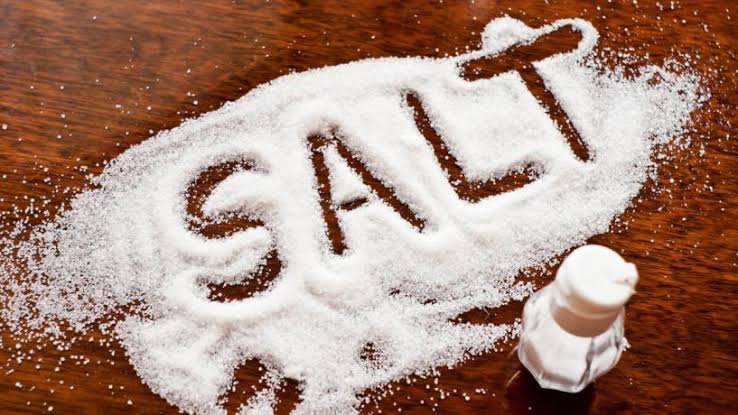
Salt is one of the most misunderstood yet essential minerals in human health. For centuries, it has been praised, feared, demonized, and even used as currency. Some say it leads to hypertension, while others claim it’s vital for survival. But what is the truth?
In this discussion, we’ll separate fact from fiction, explore the real dangers of salt deficiency, and examine its critical role in hydration, nerve function, and overall health. Can you recall the definition of Salt, from highschool chemistry? It doesn’t matter.
WHAT IS SALT?
Salt is a mineral primarily composed of sodium chloride (NaCl). It is essential for numerous bodily functions, including maintaining fluid balance, nerve signaling, and muscle contraction. While all dietary salt provides sodium, the source and processing methods affect its mineral content and health benefits.
Types of Salt & Their Benefits
- Table Salt (Refined Salt) – Highly processed, stripped of trace minerals, and often contains additives like anti-caking agents and iodine. While it provides sodium, it lacks additional health benefits.
- Sea Salt – Harvested from evaporated seawater. Contains small amounts of minerals like magnesium, potassium, and calcium, depending on the source. However, it can also contain trace amounts of ocean pollutants.
- Himalayan Pink Salt – Mined from ancient salt deposits, rich in trace minerals like iron (which gives it the pink color), magnesium, and potassium. Often considered the purest form due to being free from modern pollutants.
- Celtic Sea Salt – A grayish salt harvested from coastal regions, particularly in France. High in moisture and minerals, making it one of the best for electrolyte balance.
- Kosher Salt – A coarse-grained salt without additives. Its main benefit is texture and ease of use in cooking rather than nutritional superiority.
- Black Salt (Kala Namak) – A sulfur-rich salt commonly used in South Asian cuisine. Some claim it aids digestion due to its sulfur content.
Most Beneficial Type of Salt
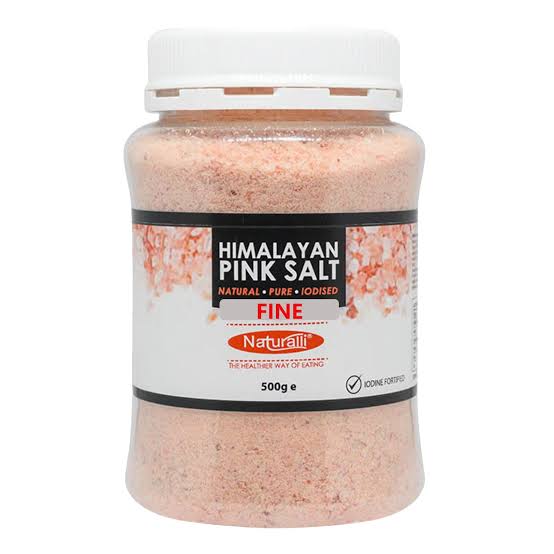
For health benefits, Himalayan Pink Salt and Celtic Sea Salt stand out due to their rich mineral content and purity.
They provide essential electrolytes beyond just sodium, supporting hydration, nerve function, and overall cellular health.
ESSENTIAL USES OF SALT IN YOUR BODY
Salt is far more than just a seasoning—it plays a fundamental role in nearly every physiological process. Here’s how:
- Fluid Balance & Hydration
Sodium in salt regulates the body’s water balance by controlling the movement of fluids in and out of cells.
Works with potassium to maintain proper hydration levels and prevent dehydration.
- Nerve Function & Electrical Signaling
Sodium and chloride ions are crucial for nerve impulses, allowing brain and muscle communication.
Without enough salt, nerve signals slow down, causing weakness, confusion, and even seizures.
- Muscle Contraction & Strength
Sodium helps muscles contract and relax properly.
A deficiency can cause cramps, weakness, and even paralysis in extreme cases.
- Blood Pressure Regulation
Salt helps maintain blood volume and pressure.
Too little salt can lead to hypotension (low blood pressure), causing dizziness and fainting.
- Stomach Acid Production (Hydrochloric Acid – HCl)
Chloride from salt is a key component of stomach acid.
Without enough salt, digestion weakens, leading to bloating, heartburn, and nutrient malabsorption.
- Preventing Hyponatremia (Low Blood Sodium)
A lack of salt in the blood leads to hyponatremia, causing headaches, nausea, confusion, and in severe cases, coma or death.
Athletes and people who drink excessive water without enough salt are at high risk.
- Nutrient Absorption & Transport
Sodium helps transport nutrients (like glucose and amino acids) across cell membranes, ensuring cells get the energy they need.
- Detoxification & pH Balance
Salt helps remove waste through urine and sweat.
It also plays a role in balancing the body’s pH, preventing excessive acidity.
- Supporting Adrenal Function & Energy Levels
The adrenal glands need sodium to produce stress hormones like aldosterone and cortisol, which regulate energy and electrolyte balance.
Low salt intake can lead to chronic fatigue, dizziness, and poor stress response (like motion sickness or postural hypotension).
- Enhancing Brain Function & Mental Clarity
Salt is essential for proper brain function.
Insufficient salt can lead to brain fog, confusion, irritability, and even cognitive decline.
Salt is a life-giving mineral, not an enemy—unless consumed in extreme excess. The key is balance.
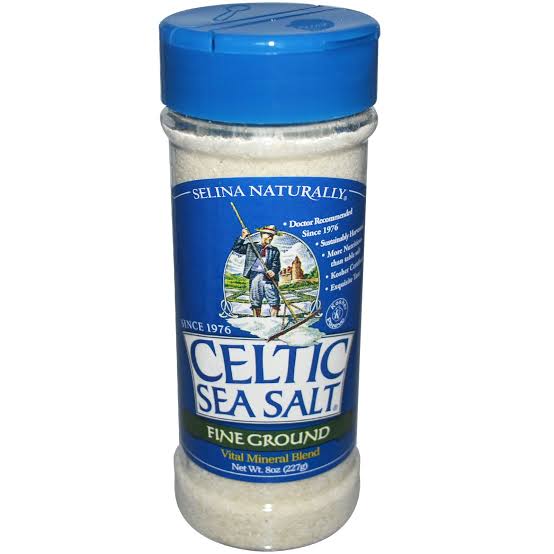
WITHOUT SALT, LIFE IS IMPOSSIBLE
I want to emphasize this point, so that you understand.
Salt is a biological necessity. Every human, animal, and even some plants rely on salt for survival.
Without it, the body would shut down, leading to death. Here’s why:
- The Human Body Runs on Salt
Every cell in your body needs sodium and chloride to function.
Without sodium, your nerves wouldn’t send signals, your muscles wouldn’t contract, and your organs would fail.
- Blood Wouldn’t Circulate Properly
Sodium is essential for maintaining blood volume and pressure.
Without it, blood pressure would drop dangerously low, leading to shock, organ failure, and death.
- Your Brain Would Stop Working
Sodium is the key to neurotransmission—the process that allows the brain to send messages to the body.
Without salt, the brain slows down, leading to confusion, seizures, coma, and death.
- Your Cells Would Explode or Shrivel
Salt controls the movement of water in and out of cells.
Without it, cells either swell and burst or shrivel and die.
- Digestion Would Collapse
Chloride from salt is needed to produce stomach acid (HCl).
Without it, food wouldn’t break down, leading to malnutrition and starvation.
- The Heart Would Stop Beating
Sodium and potassium regulate the electrical impulses that keep your heart beating.
Without salt, the heart rhythm becomes irregular, leading to cardiac arrest.
- Death by Hyponatremia
Hyponatremia (dangerously low sodium levels) is fatal if untreated.
Athletes, extreme dieters, and people drinking too much water without salt are at high risk.
Throughout History, Salt Was More Valuable Than Gold
Ancient civilizations fought wars over salt.
Roman soldiers were paid in salt (“salary” comes from “sal”—Latin for salt).
The body cannot store sodium long-term, making constant intake necessary.
Salt is not optional—it is the foundation of life.
CONNECTION BETWEEN SALT AND HYPERTENSION
For decades, salt has been blamed for high blood pressure (hypertension).
Governments and health organizations have pushed low-salt diets, claiming they reduce heart disease risk.
But is this the full truth? Let’s break it down.
- The Sodium-Hypertension Myth
The idea that salt causes hypertension comes from studies on salt-sensitive individuals—a small percentage of the population.
However, research shows most healthy people can consume salt without significant increases in blood pressure.
- The Real Cause of Hypertension
Salt alone is not the primary cause of high blood pressure. The real culprits are:
Processed Foods – High in refined carbs and unhealthy fats, which damage blood vessels.
Sugar & Insulin Resistance – Sugar triggers insulin spikes, which cause the body to retain sodium, leading to hypertension.
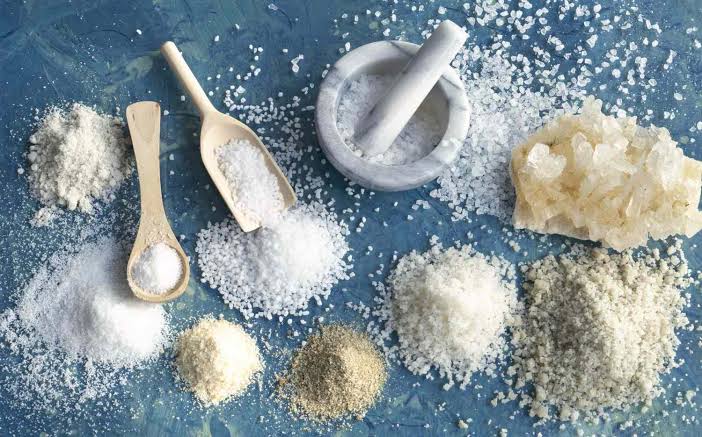
Low Potassium Intake – Sodium and potassium work together; too much sodium with too little potassium raises blood pressure.
Chronic Stress – Raises cortisol, which constricts blood vessels.
Sedentary Lifestyle – Lack of movement weakens blood circulation.
- Salt Restriction Can Be Dangerous
Studies show that excessively low salt intake can actually increase the risk of heart disease, stroke, and early death.
Low sodium can trigger hormonal imbalances (renin, aldosterone), which raise blood pressure instead of lowering it.
- Who Should Watch Salt Intake?
People with kidney disease – Kidneys regulate sodium; if damaged, excess sodium can accumulate.
Salt-sensitive individuals – A small percentage of people experience significant blood pressure spikes from high salt intake.
- Balanced Salt Intake is Key
Instead of cutting salt drastically, focus on:
Using Natural Salts (Himalayan or Celtic salt) instead of refined table salt.
Eating Whole Foods – Avoid processed foods loaded with hidden sodium and sugar.
Balancing Sodium & Potassium – Eat potassium-rich foods like bananas, avocados, and leafy greens.
Staying Hydrated – Drink enough water to help kidneys regulate sodium levels.
Bottom Line: Salt is Not the Enemy
For most people, moderate salt intake is safe and essential.
The real danger comes from a modern diet full of sugar, processed foods, and lifestyle imbalances—not natural salt itself.
HUNGER DOESN’T MEAN YOU EAT FOOD…Your Body Is Tricking You To Consume Salt
Many times, when you feel hungry, your body is not actually asking for food—it’s asking for salt.
Modern diets have conditioned people to think hunger always means a need for calories, but in reality, it’s often a sign of electrolyte deficiency, especially sodium.
- The Link Between Salt and Appetite
The body has a built-in mechanism to regulate salt levels.
When sodium levels drop, the body sends a false hunger signal, tricking you into eating.
This is why eating salty food often makes hunger disappear instantly, even with small portions.
- How Low Salt Causes Constant Hunger
Sodium is needed for nutrient absorption. Without enough salt, food doesn’t provide proper energy, making you feel hungry again soon.
Low sodium leads to insulin resistance, causing blood sugar fluctuations that create unnecessary hunger.
The body craves salty, processed foods (chips, fries, fast food) because it instinctively knows it needs salt—but modern junk food overloads you with bad ingredients instead.
- Why Eating More Salt Can Reduce Cravings
A well-balanced intake of natural salt helps regulate appetite naturally.
Athletes and people on low-carb diets often notice that increasing salt reduces hunger and boosts energy.
Many cases of “emotional eating” or binge eating are actually just the body trying to replenish sodium.
- Simple Fix: Salt Before Meals
Try drinking a salted water solution (salt + water) when feeling hungry.
If the hunger disappears, it was a salt craving, not a calorie need.
This trick works especially well for people on OMAD (One Meal A Day) or intermittent fasting, keeping energy levels stable without unnecessary eating.
Eat Salt, Not Junk
Instead of eating mindlessly, recognize when hunger is actually a salt deficiency.
Eating natural salts like Himalayan or Celtic salt can help control appetite, reduce cravings, and maintain stable energy levels throughout the day.
Why Salted Water is the Best Hydration for Exercise
Most people think hydration means just drinking plain water. Wrong.
When you sweat during exercise, you lose water AND electrolytes, especially sodium.
If you only drink plain water, you dilute your remaining electrolytes, leading to fatigue, cramps, and even hyponatremia (dangerously low sodium levels).
- Sweat is Salty for a Reason
Sweat contains sodium, potassium, magnesium, and chloride.
Losing too much sodium without replacing it can cause weakness, dizziness, confusion, and even death in extreme cases.
- Water Alone Can Be Dangerous
Drinking too much plain water during exercise can cause “water intoxication,” leading to hyponatremia (low blood sodium).
Symptoms include extreme hunger, extreme muscle weakness/fatigability, nausea, headaches, confusion, muscle spasms, and in severe cases, coma or death.
- The Perfect Hydration Formula: Salted Water
Instead of drinking plain water, mix:
✔ 1 liter of water
✔ 1/2 to 1 teaspoon of natural salt (Himalayan or sea salt)
✔ Optional: A squeeze of lemon for flavor & extra minerals
This simple drink replaces lost electrolytes, prevents muscle cramps, and maintains peak performance.
- Salted Water Boosts Energy & Endurance
Sodium helps muscles contract properly, reducing cramps and fatigue.
Prevents dizziness and low blood pressure, keeping you strong throughout your workout.
Faster recovery – Salt helps replenish glycogen stores post-exercise.
- Why Sports Drinks Are a Scam
Most commercial sports drinks (like Gatorade) are filled with sugar, artificial colors, and low-quality sodium.
They cause sugar crashes and don’t provide the right balance of electrolytes.
Homemade salted water is superior, cheaper, and 100% natural.
Salted Water is Your Natural Performance Enhancer
If you exercise, ditch the sugary drinks and hydrate with salted water.
It keeps you strong, sharp, and unstoppable—just like a true warrior.
Your Kidneys: Masters of Managing Salt
One of the most powerful and underappreciated organs in the body are the kidneys.
These vital organs are responsible for maintaining the body’s electrolyte balance, and that includes managing excess salt.
Despite common misconceptions, your kidneys are more than capable of handling excess salt—but only if they’re functioning well and the body is hydrated.
Here’s how they manage salt:
- Kidneys Filter and Excrete Excess Salt
The kidneys are designed to filter blood and remove waste, including excess sodium, which is present in salt.
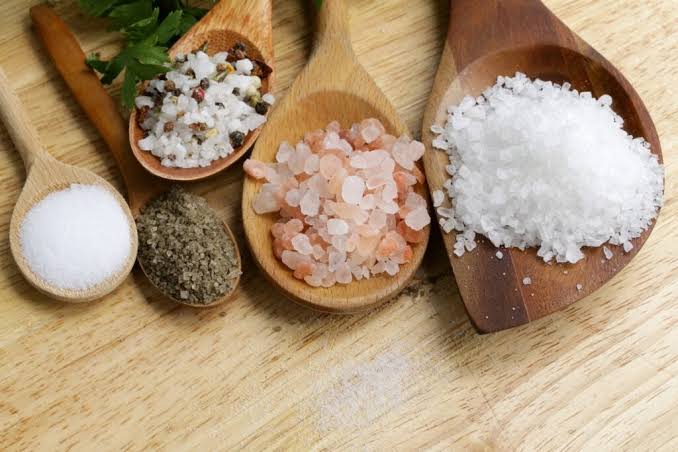
Sodium is filtered out of the bloodstream in the kidneys and excreted through urine. If you consume too much salt, your kidneys will increase the amount of sodium they excrete to restore balance.
Healthy kidneys can excrete up to 20-25 grams of salt per day, well beyond the typical daily intake of 5-10 grams.
- How the Kidneys Maintain Balance
When sodium levels are too high, the kidneys respond by increasing the production of urine to expel excess salt.
The renin-angiotensin-aldosterone system (RAAS) plays a key role in regulating salt balance.
When sodium levels drop, this system signals the kidneys to retain salt; when sodium levels are high, it signals for excretion.
- Hydration Matters
Adequate hydration supports kidney function.
When you’re well-hydrated, the kidneys can effectively flush excess sodium out of the system.
If you’re dehydrated, the kidneys have to conserve both water and sodium, which means less sodium is excreted, and you may experience higher blood pressure as a result.
- Salt and Kidney Health: Balance is Key
While the kidneys can handle excess salt, overloading them consistently can strain kidney function, especially if there are pre-existing kidney issues or dehydration.
Chronic high salt intake can lead to kidney disease, where the kidneys lose their ability to properly excrete excess sodium.
- What Happens if You Consume Too Much Salt Without Enough Water
If you consume too much salt without enough water to balance it, the kidneys struggle to flush out the excess, and this can lead to high blood pressure and potentially kidney damage.
Salt retention without adequate fluid intake can lead to edema (swelling) and other complications.
- The Role of Salt in Blood Pressure Regulation
Sodium has a significant impact on blood volume and pressure.
When your body retains too much salt, it also retains water, leading to higher blood pressure.
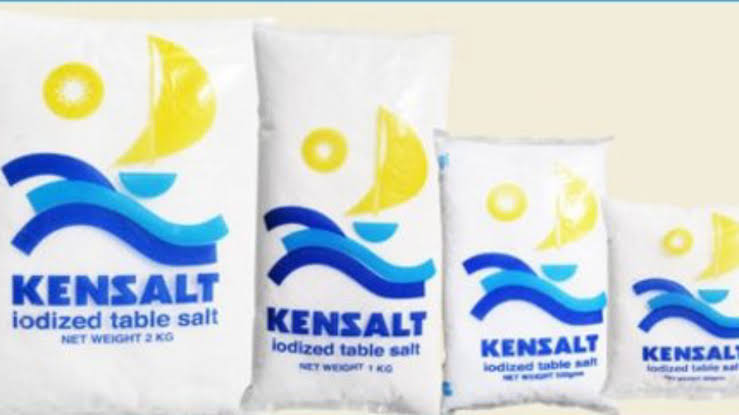
The kidneys help regulate blood pressure by excreting excess sodium and water, but chronic overconsumption of salt can overwhelm this system, leading to hypertension.
Your Kidneys Can Handle Excess Salt—If You Hydrate Right
Your kidneys are remarkably efficient at managing excess salt, but they need hydration and balance to do their job effectively.
It’s not about avoiding salt entirely—it’s about keeping things in check with proper hydration and a well-rounded diet.
We’ve covered many important aspects of salt, but there are still a few more nuances and interesting facts about salt that deserve attention.
Here’s what we haven’t touched on yet:
- Salt’s Role in Acid-Base Balance
Salt, specifically sodium, plays a crucial role in maintaining the acid-base balance in the body.
Sodium helps regulate the pH levels of your blood, ensuring your body stays in the optimal range of 7.35-7.45.
Without proper sodium balance, acidosis or alkalosis can occur, both of which can be life-threatening.
- Salt and the Nervous System
Neurons (nerve cells) rely on sodium to send electrical impulses.
The movement of sodium in and out of cells is what enables the transmission of signals throughout the nervous system.
Too little sodium disrupts brain function, leading to symptoms like confusion, easy fatigability, dizziness, or seizures.
- Salt’s Effect on Sleep
Interestingly, moderate salt intake can promote better sleep by helping the body relax.
Sodium helps in hydrating the body, which regulates fluids and supports the function of the pineal gland, the part of the brain that regulates melatonin (sleep hormone).
On the flip side, too much salt right before bed can lead to thirst or swelling, potentially disrupting sleep.
- Salt as a Natural Preservative
Salt has been used for centuries as a preservative, as it helps prevent the growth of bacteria and mold.
Curing meat, preserving vegetables, and fermenting foods—all of these processes depend on salt to extend shelf life and maintain food safety.
- Salt as a Vital Element in Hormonal Regulation
Salt plays a role in regulating hormones, such as aldosterone and antidiuretic hormone (ADH).
These hormones help control the balance of sodium and water in the body, which affects blood pressure and fluid retention.
Chronic low sodium levels can disrupt this hormonal balance and lead to endocrine issues.
- The Historical and Cultural Significance of Salt
Salt has held significant cultural, spiritual, and economic importance throughout history.
In many cultures, salt was once so valuable that it was used as a form of currency, with Roman soldiers paid in salt, which is where the term “salary” comes from.
Salt also played a key role in religious ceremonies, symbolizing purification and preservation in many traditions.
- Salt and Weight Loss Myths
There’s a myth that salt contributes to weight gain, but the reality is that excess sodium causes water retention, not fat accumulation.
Reducing salt intake might make you lose water weight, but it doesn’t necessarily result in true fat loss.
Balance is key—enough salt helps with metabolism and energy levels, but too much leads to swelling and bloat.

- Salt in the Diet of Athletes and High Performers
Salt plays a major role in maintaining energy levels and preventing dehydration for athletes and people engaging in physical labor.
Athletes who sweat heavily or exercise intensely for long periods need to replenish their electrolytes with salted water to avoid cramping, fatigue, and dehydration.
- Salt and Mental Performance
Salt balance can affect cognitive function. A small amount of salt might actually help you think more clearly, but too much or too little can lead to issues with focus and clarity.
Sodium regulates fluid balance around the brain, supporting neurotransmitter function.
Salt is More Complex Than You Think
While we’ve discussed many facets of salt, its effects on the body are complex, balancing hormonal regulation, hydration, performance, and even mental clarity.
The key to health is moderation and balance—salt isn’t inherently harmful but should be consumed with an awareness of the body’s unique needs.
Why You Should Ignore the WHO’s Recommended Daily Intake (RDI) of Salt
The World Health Organization (WHO) recommends that adults consume no more than 5 grams of salt per day (about one teaspoon),
but in reality, this recommendation doesn’t always align with individual needs, cultural dietary practices, or modern lifestyle factors.
Here’s why the WHO’s RDI of salt might not be the best guideline for everyone:
- The WHO’s Recommendations Are Based on Generalized Data
The WHO’s RDI is based on average needs and doesn’t take into account individual variability.
People’s sodium requirements can vary dramatically based on factors like age, activity level, climate, and overall health.
For instance, athletes, individuals in hot climates, or people with certain medical conditions may need more salt to maintain optimal performance and health.
One-size-fits-all recommendations don’t work well when it comes to something as essential as salt.
- Excessive Restriction Can Lead to Negative Health Consequences
Undereating salt—especially for people who exercise or live in hot climates—can lead to electrolyte imbalances, dehydration, and even hyponatremia (dangerously low sodium levels).
Salt is critical for nerve function, muscle contraction, and regulating blood pressure. Cutting it too low may lead to cramps, dizziness, and fatigue.
For those on low-carb diets (like keto), more salt is necessary to prevent hyponatremia, since low-carb diets cause the body to excrete more sodium.
- The Focus on Salt Rather than Whole Diets
The WHO’s focus on salt intake is often an oversimplification. While high salt intake is linked to certain health issues, particularly hypertension, it’s not the sole factor.
Processed foods, which are often high in salt, also contain other unhealthy ingredients like sugars, unhealthy fats, and artificial additives.
A better focus would be on overall diet quality rather than simply cutting salt, as a balanced, nutrient-rich diet plays a far greater role in preventing chronic diseases.
- Salt is Essential for Performance, Not Just a Health Risk
Athletes and people engaging in intense physical activity often require higher levels of salt to replenish the electrolytes lost through sweat.
The RDI’s lower salt recommendations can be a hindrance to performance, leading to dehydration, muscle cramps, and reduced endurance.
Salt helps the body retain water, and when you’re active, this helps maintain blood pressure and fluid balance, both critical for optimal performance.
- Evolutionary Perspective: We’ve Evolved with Salt
Humans have evolved with higher salt intake, especially in the past, when food preservation methods like salting were commonplace.
Historically, our ancestors consumed much higher levels of salt, and the body has adapted to process and regulate salt efficiently.
The RDI’s lower salt intake recommendations seem to ignore the evolutionary realities of our bodies, which were built to handle natural, higher salt levels found in whole foods.
- Different Needs for Different People
People with certain conditions (like adrenal insufficiency, or postural hypotension) may need more salt to regulate blood pressure and maintain electrolyte balance.

On the flip side, people with kidney disease or heart conditions may need to monitor salt intake more closely—but this should be determined by a healthcare provider, not a blanket recommendation.
Salt needs also vary depending on your lifestyle, whether you’re sedentary or highly active.
- The Myth of Universal High Salt Intake Leading to High Blood Pressure
While high salt intake can contribute to hypertension in some individuals, it’s not a universal truth.
Many people can tolerate higher levels of salt without adverse effects, especially when they have healthy kidneys and maintain adequate hydration.
Blood pressure is influenced by multiple factors, including genetics, stress, overall diet, and physical activity, not just salt consumption alone.
- Natural Salt vs. Processed Salt
Most of the concern around salt intake is about processed, refined salt, which lacks the minerals found in natural salts like Himalayan or Celtic salt.
Natural salts contain trace minerals that help balance and regulate sodium levels, providing more health benefits compared to the sodium chloride found in refined table salt.
The focus should be on eliminating processed, high-sodium foods rather than cutting out salt altogether, which may deprive the body of essential minerals.
- Salt Helps in Hydration
As we discussed earlier, salted water is one of the best ways to hydrate during physical activity. The body needs sodium to help retain water and maintain electrolyte balance.
Cutting salt intake too drastically can lead to dehydration, as the body loses its ability to retain water, which is crucial for both performance and health.
- Trust Your Body’s Signals Over Generalized Guidelines
The body has natural mechanisms for regulating salt intake, and often, cravings for salty food are a sign that your body needs it.
The WHO’s salt recommendations ignore individual variation—you should listen to your body and adjust your salt intake based on how you feel, your activity levels, and any health concerns you may have.
While the WHO’s recommendations are made with public health in mind, they may not be suitable for everyone.
Salt is essential for various bodily functions, and moderation and balance are key.
Rather than adhering strictly to the WHO’s guidelines, it’s better to personalize your salt intake, based on your specific needs, lifestyle, and health goals.

